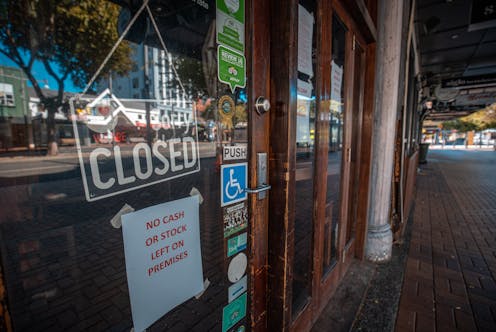Would 'COVID loans' be a more affordable and sustainable way to support national economies?
- Written by Richard Meade, Research Fellow in Economics, and in Social Sciences & Public Policy, Auckland University of Technology

Faced with a COVID-19 pandemic of unknown severity and duration, governments around the world are looking for effective and sustainable ways to maintain economic confidence and employment.
Even New Zealand, where lockdowns have been few and short-lived, is confronting the reality of repeated lockdowns, especially since the United Kingdom variant has now been detected[1] in community cases.
With vaccines likely to require all of 2021 to be rolled out in significant numbers[2], more economic disruption has to be expected this year, with each successive shock further testing economic resilience.
For many countries, targeted wage subsidies[3] of some form have been the principal tool for maintaining employment and economic confidence, often complemented by small business loans. While these have clearly been useful, they also have clear limitations — not least their cost.
This raises questions about the ongoing viability of wage subsidies and small business loans as the economic response measures of choice.
My recently published policy paper[4] proposes an alternative approach, modelled on student loans schemes such as those operating in New Zealand, Australia and the UK.
Rather than attempting to support firms and households to pay wages, rents and other expenses, this alternative enables firms and households whose incomes have fallen due to the pandemic to take out government-supported “COVID loans” to restore their pre-pandemic income levels — a form of “revenue insurance”.
I argue this alternative approach will be not just more affordable and sustainable, but will also be more effective and more equitable.
Lowering the burden on future taxpayers
Insuring small business and household revenues means they should be able to meet all their outgoings, not just wages and rents which are subject to selective support measures under the current approach.
Borrowers can simply determine which outgoings they need to prioritise, and access the resources they need to meet those costs.
Read more: Close contact test results will be crucial to whether Auckland’s level 3 lockdown is extended beyond three days[5]
This also simplifies administration, since only one support scheme is required, rather than multiple schemes. With student loan schemes[6] already in place in many countries, experience and infrastructure are available to support the rollout of the proposed loans.
Just as importantly, firms and households that take out COVID loans would effectively be borrowing against their own future incomes. This places less of a burden on future taxpayers than wage subsidies financed through extra government debt.
In turn this makes the approach more equitable than debt-financed wage subsidies, since that extra government debt is a charge against future generations.
More affordable for governments
In terms of affordability, loans to make up drops in income would be repaid via tax surcharges on those taking out loans, as and when their future incomes allow. This means would-be borrowers need not be deterred by fixed repayment deadlines in times of ongoing economic uncertainty.
Furthermore, since any firms and households borrowing against their own future incomes will ultimately be repaying their debt, COVID loans represent an asset on government balance sheets.
This offsets the extra liabilities governments take on by borrowing to finance these loans — something wage subsidies do not do. This increases the affordability of a loans-based approach from a government perspective (even allowing for defaults and subsidies implicit in student loan schemes).
Read more: It's still too soon for NZ to relax COVID-19 border restrictions for travellers from low-risk countries[7]
Using illustrative data for New Zealand, my paper shows COVID loans are 14% cheaper than wage subsidies (and small business loans) in terms of their impact on net government debt.
More importantly, they are almost 2.5 times as effective in terms of the level of support they offer. And since 67% of the cost of COVID loans ultimately falls to those who make use of them (allowing for defaults and implicit subsidies), they place less of a burden on future taxpayers than deficit-funded wage subsidies.
Maintaining economic confidence
Affordability is also enhanced by a subtle feature of the proposed scheme. By making COVID loans generally available to all firms and households, the scheme sustains economic confidence.
Firms and households are assured the other firms and households they rely on for their own economic prospects have access to the same effective financial lifeline throughout the pandemic.
Households can therefore keep spending confidently, and employers can confidently keep employing. This means the loans might actually not need to be used to any great extent. Their strength lies in preventing economic decline — much like a vaccine’s strength lies in preventing disease.
Finally, COVID loans are not just a sustainable policy tool for minimising the economic harm of COVID-19. They also provide a benchmark for assessing how cost-effective other support measures such as wage subsidies have been, and a possible solution for future pandemics.
References
- ^ now been detected (www.theguardian.com)
- ^ rolled out in significant numbers (www.health.govt.nz)
- ^ targeted wage subsidies (www.beehive.govt.nz)
- ^ policy paper (doi.org)
- ^ Close contact test results will be crucial to whether Auckland’s level 3 lockdown is extended beyond three days (theconversation.com)
- ^ student loan schemes (www.parliament.nz)
- ^ It's still too soon for NZ to relax COVID-19 border restrictions for travellers from low-risk countries (theconversation.com)
Authors: Richard Meade, Research Fellow in Economics, and in Social Sciences & Public Policy, Auckland University of Technology







